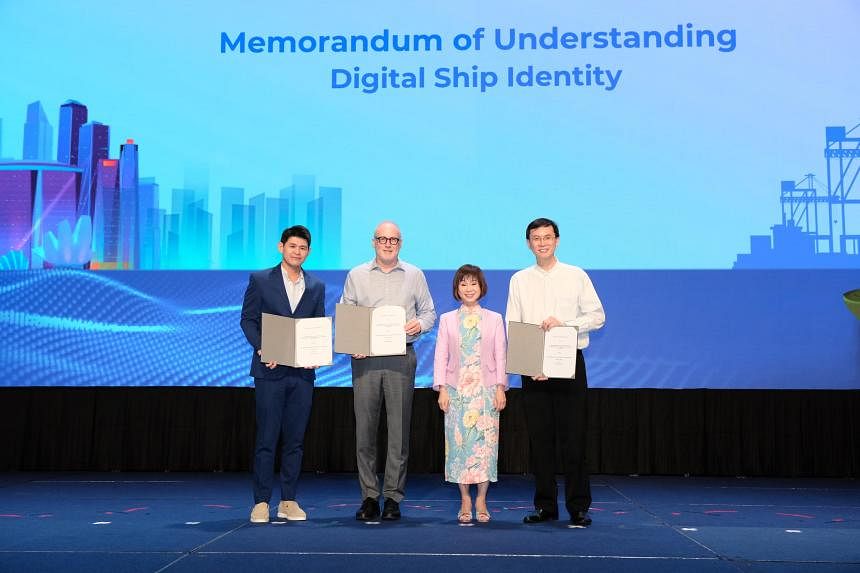SINGAPORE – Ships in Singapore’s waters will pilot the use of digital ship identities – similar to that of Singpass credentials – for seamless port clearance and bunkering or refuelling operations.
The Marine Vessel Pass (MVP) trial at Singapore’s port was inked as an agreement between the Maritime and Port Authority of Singapore (MPA), S&P Global Market Intelligence and Bunkerchain on April 16.
The first-of-its-kind MVP service will enable the automated and digital exchange of information, removing the need for vessel operators and regulatory personnel to verify documentation with wet-inked ship stamps and physical signatures, said Bunkerchain chief executive Leon Ling.
The Singapore-based technology firm developed MVP with information and analytics firm S&P Global Market Intelligence, which manages the International Maritime Organisation (IMO) database of unique identification numbers that all vessels are assigned.
The MVP will serve as verified and secure credentials for ships worldwide, since IMO’s database is universally recognised in the industry.
The trial will involve vessels travelling between the Port of Rotterdam and Singapore’s port, and will take place from the third quarter of 2024 for six to nine months. The participating ships are still being identified.
Currently, ships sailing in the nation’s waters do not directly contact ports or service providers – such as PSA Corporation – when they arrive at Singapore’s port.
Instead, agents or third-party collaborators appointed by the ships submit identification documents on their behalf.
The current identification process at most overseas ports comprises the handing over of paper-based documentation to regulatory personnel for verification, which could lead to human errors and operational inefficiencies.
The present lack of access to live and direct information on ships – contact information, changing of flags, vessel names or shipowners – may also create operational and documentation issues.
The MVP contains validated and updated information on the ship, including its IMO number, registration details, and operational data such as contact information of the people in charge.
Ship operators log into the MVP app or website to present their authenticated digital identity for port clearance and digital bunkering operations.
These digital credentials are verifiable in real time, allowing ports and service providers to quickly authenticate the identity and status of arriving ships, Mr Ling said.
The seamless data exchange – which involve digitally identifying and verifying access of ships – will reduce the time, resources and manpower required for manual checks and documentation processing. This will enhance operational efficiency and reduce the potential for errors, he added.
Speaking on the second day of Singapore Maritime Week on April 16, Senior Minister of State for Transport Amy Khor said if MVP is successfully deployed, it can make digital transactions in the maritime sector more secure, trusted and efficient, as well as enable future digitalisation of operations.
The MVP has been in use since January 2024 at the Jurong Port Universal Terminal for the loading of bunker cargoes. However, this trial marks the first time the marine vessel pass will be used here for the port clearance.
The trial will tap the Singapore-Rotterdam green and digital shipping corridor initiative, which aims to cut shipping emissions, as well as to improve the efficiency of goods shipping and port operations by engaging partners to adopt digital solutions and use cleaner fuels.
The trial will also test the verification and validation of vessels transferring and receiving fuel at Singapore’s port.
Besides harmonising data across the industry, Mr Ling said that the MVP will support the growth of such shipping corridors globally and create greater interconnectivity.
He added that he hopes the use of MVP will be expanded to other ports.
Separately, Dr Khor noted the creation of a proof-of-concept of a digital twin – or a virtual replica – that visualises the behaviour of plume clouds during a methanol bunkering leak on a vessel at sea.
Developed by MPA, the Agency for Science, Technology and Research (A*Star) and other industry partners, the replica will allow the industry to better understand safety risks of methanol refuelling, and help develop necessary safety standards as well as incident response plans, added Dr Khor.
This will bring the maritime sector one step closer to adopting clean marine fuels, said Dr Khor.

